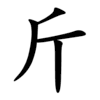斤
| ||||||||
| ||||||||
Translingual
| Stroke order | |||
|---|---|---|---|
| Stroke order | |||
|---|---|---|---|
 | |||
Han character
斤 (Kangxi radical 69, 斤+0, 4 strokes, cangjie input 竹一中 (HML), four-corner 72221, composition ⿸𠂆丅 or ⿸𠂋丨)
- Kangxi radical #69, ⽄.
Derived characters
References
- KangXi: page 479, character 4
- Dai Kanwa Jiten: character 13534
- Dae Jaweon: page 837, character 23
- Hanyu Da Zidian (first edition): volume 3, page 2022, character 1
- Unihan data for U+65A4
Chinese
| simp. and trad. |
斤 | |
|---|---|---|
| alternative forms | 釿/𬬱 “axe” 觔/斤 “catty” | |
Glyph origin
| Historical forms of the character 斤 | ||||
|---|---|---|---|---|
| Shang | Western Zhou | Warring States | Shuowen Jiezi (compiled in Han) | Liushutong (compiled in Ming) |
| Oracle bone script | Bronze inscriptions | Chu slip and silk script | Small seal script | Transcribed ancient scripts |
 |
 |
 |
 |
 |
Characters in the same phonetic series (斤) (Zhengzhang, 2003)
| Old Chinese | |
|---|---|
| 蘄 | *ɡɯ, *kɯl, *ɡɯn |
| 祈 | *ɡɯl |
| 頎 | *ɡɯl |
| 旂 | *ɡɯl |
| 圻 | *ɡɯl, *ŋɡɯːn, *ŋɡɯn |
| 蚚 | *ɡɯl, *ɡɯːls |
| 岓 | *ɡɯl |
| 玂 | *ɡɯl |
| 沂 | *ŋɡɯl |
| 掀 | *qʰan |
| 釿 | *ŋɡrɯnʔ, *ŋkɯn |
| 齗 | *ŋɡrɯnʔ, *ŋɡɯn |
| 听 | *ŋɡrɯnʔ, *ŋɡɯnʔ |
| 垽 | *ŋrɯns, *qɯns |
| 斤 | *kɯn, *kɯns |
| 菦 | *kɯnʔ |
| 靳 | *kɯns |
| 劤 | *kɯns |
| 勁 | *kɯns, *keŋs |
| 赾 | *kʰɯnʔ |
| 芹 | *ɡɯn |
| 近 | *ɡɯnʔ, *ɡɯns |
| 斦 | *ŋɡɯn |
| 欣 | *qʰɯn |
| 忻 | *qʰɯn |
| 昕 | *qʰɯn |
| 訢 | *qʰɯn |
| 炘 | *qʰɯn, *qʰɯns |
| 邤 | *qʰɯn |
| 庍 | *qʰɯns, *mpreːɡs |
| 焮 | *qʰɯns |
Pictogram (象形) - an axe.
Etymology
- ax
- Unclear. Matisoff (2000) relates it to Proto-Lolo-Burmese *gyan (“pickax”); possibly also connected to Proto-Hmong-Mien *cwI:m (“axe”), Proto-Tai *xwaːnᴬ (“axe”) and/or Proto-Kam-Sui *kwan (Schuessler, 2007).
Pronunciation 1
Definitions
斤
- catty, a unit of weight
- (Mainland China) catty or jin, a traditional unit of weight, equal to 0.5 kilograms
- (Hong Kong) catty or kan, a traditional unit of weight, legally defined as equal to 0.60478982 kilograms (公斤 or sometimes approximated as 500 grams)
- (Taiwan) catty, a traditional unit of weight, equal to 0.6 kilograms, also equal to 16 taels
- (archaic) axe; hatchet
- 匠石運斤成風,聽而斫之。 [Classical Chinese, trad.]
- From: Zhuangzi, circa 3rd – 2nd centuries BCE, translated based on James Legge's version
- Jiàng Shí yùn jīn chéng fēng, tīng ér zhuó zhī. [Pinyin]
- (The artisan) Shi whirled his axe so as to produce a wind, which immediately carried off the mud entirely.
匠石运斤成风,听而斫之。 [Classical Chinese, simp.]
- keen; shrewd
See also
Pronunciation 2
Compounds
Further reading
- “Entry #807”, in 臺灣閩南語常用詞辭典 [Dictionary of Frequently-Used Taiwan Minnan] (in Chinese and Min Nan), Ministry of Education, R.O.C., 2011.
Japanese
Korean
Vietnamese
This article is issued from Wiktionary. The text is licensed under Creative Commons - Attribution - Sharealike. Additional terms may apply for the media files.